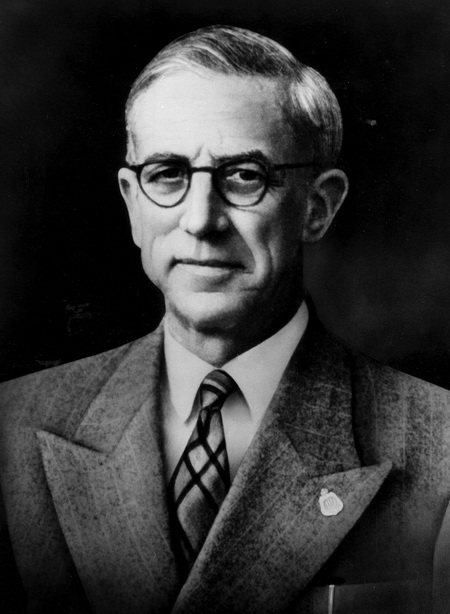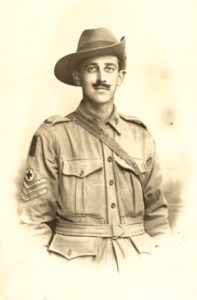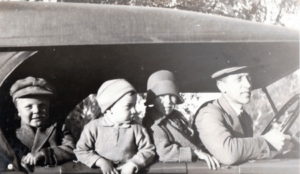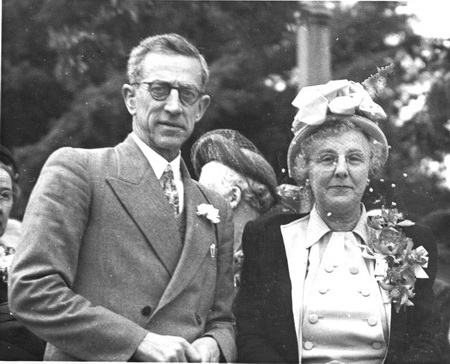 Peter Gissing will be speaking about his grandfather, Harry Gissing, at our Wagga and District Historical Society Meeting this Monday, 19th July starting at 7.30pm at the Museum of the Riverina at the Botanic Garden’s
Peter Gissing will be speaking about his grandfather, Harry Gissing, at our Wagga and District Historical Society Meeting this Monday, 19th July starting at 7.30pm at the Museum of the Riverina at the Botanic Garden’s
Harry Gissing was born in 1888 at Rockdale in Sydney although soon after his birth the family moved to Melbourne and he spent the first 11 years of his life there before returning to Sydney.
After completing an apprenticeship and university exams he qualified as a Pharmacist in 1913.
He enlisted aged 26 years, 14 Dec. 1914 and served with the 1st Field Ambulance, Australian Army Medical Corps, from January 1915 until March 1916, when he was transferred to the 14th Field Ambulance. He was promoted to Corporal 31 May 1916 and Sergeant 18 June 1916.
During his four and a half years’ service in World War 1 Harry Gissing kept a regular diary which grew to fill ten volumes which were passed on to the State Library of NSW in 1920. They have been digitised and transcribed by the Library and can be accessed here http://acms.sl.nsw.gov.au/item/itemDetailPaged.aspx?itemID=422378
He embarked from Sydney with the 1st Field Ambulance on 11th February 1915 aboard the “Seang Choon”. Following a period in Egypt, he was transferred to Lemnos in early April 1915. He witnessed the Anzac Gallipoli landing on 25th April from a medical ship stationed offshore and recorded in his diary “I will never forget Sunday, 25th April. I really believe it will mark an era in Australian history. On this day, Australians proved themselves. They landed under heavy fire – a thing rarely attempted, and never flinched once, and the result was victory. Our men were deliberately picked for the honour, and proved that the trust shown in them was not misplaced.”
Following the Gallipoli campaign Harry saw active service on the Western Front for the remainder of the war, rising to the rank of Warrant Officer Class 2.
 On 26th November 1916 he wrote in his diary “I start this new diary, the 3rd since enlistment under conditions perhaps the worst since war was known, i.e., the Somme Offensive. Such tremendous efforts and concentration of the results of the greatest intellects of the age have never before been availed of for one purpose, and now ‘tis used for the destruction of humanity. Such a possibility in this enlightened age even was beyond the wildest of dreams, and yet we are now in the third year of this devastating, wholesale murder.”
On 26th November 1916 he wrote in his diary “I start this new diary, the 3rd since enlistment under conditions perhaps the worst since war was known, i.e., the Somme Offensive. Such tremendous efforts and concentration of the results of the greatest intellects of the age have never before been availed of for one purpose, and now ‘tis used for the destruction of humanity. Such a possibility in this enlightened age even was beyond the wildest of dreams, and yet we are now in the third year of this devastating, wholesale murder.”
Harry was awarded the Meritorious Service Medal in 1918 with the citation reading “….during the operation of the capture of Polygon Wood, East of Ypres….he took charge of gassed patients. As an NCO in this important work, which involves risk, he was exposed to shell fire. S/Sgt Gissing’s care and ability was shown in his regard for his patients and the absence of casualties in his personnel.”
He returned to Australia on 9th May 1919 and soon after came to Wagga to relieve a local pharmacist, Frank Sanderson. Following the death of Mr Sanderson during the Spanish flu epidemic, he purchased the business which was located next to the Australian Hotel, opposite the Post Office in Fitzmaurice Street.
Harry married Ethel Booty, daughter of Enoch William Booty, Wagga manager for the Bank of New South Wales in 1920. They had three sons, Morris, George and Henry and one daughter, Judith.
Harry was first elected to the Wagga City Council in 1920 and was an Alderman until 1923 and then again from 1934 until his death in 1953. He was Mayor of Wagga from 1937 to 1944 and from 1949 to 1951.
Harry Gissing was President of the Wagga Wagga branch of the Returned Sailors and Soldiers Imperial League from 1920 until 1921 and vice president in 1923.
He was president of the newly formed A.I.F. Cricket Team in 1920 and secretary of the Wagga Wagga branch of the Riverina New State Movement in 1921. He was also president of the Greater Wagga League in 1924-25.
 He was chairman of the Committee formed in 1925 which established the Ambulance Service in Wagga and led to construction of the Johnston Street, Ambulance Station in 1929. He served on the committee of the Wagga and District Ambulance committee from 1925 until his death in 1953 including many years as chairman. He also served as a member of the NSW Ambulance Transport Service board.
He was chairman of the Committee formed in 1925 which established the Ambulance Service in Wagga and led to construction of the Johnston Street, Ambulance Station in 1929. He served on the committee of the Wagga and District Ambulance committee from 1925 until his death in 1953 including many years as chairman. He also served as a member of the NSW Ambulance Transport Service board.
He was for many years associated with the Boy Scout movement and was the first President of the Eastern Riverina Boy Scouts Association formed in 1927. He was also President of the building Committee for Wagga’s first scout hall in Forsyth Street which was opened by the Prime Minister, Joseph Lyons in 1937.
Harry Gissing was a charter member of the Wagga Rotary Club in 1930 and was District Governor of Rotary District 30 from 1952 until his death in 1953. He was also a foundation member of Wagga Legacy in 1932.
Harry Gissing was chairman of appeal for the Wagga Wagga Base Hospital in 1940. And was also President of the Red Cross during the 1940’s.
He was a member of the Southern Riverina County Council from 1945 until 1953 and served as its chairman from 1949 until 1951.
Harry Gissing had a significant interest in wireless and electronics and in 1928 he opened Wagga Wireless Distributors which initially operated from his Pharmacy basement but grew to become a major distributor of wireless sets and similar equipment throughout NSW.
As a Pharmacist Harry Gissing conducted the Pharmacy in Fitzmaurice and at various times was also involved with Pharmacies in Gurwood and Baylis Streets as well as in Dean Street, Albury. He was joined by his son Morris after Morris’s service in World War 2 and later Morris’s son, Peter followed on the family tradition in Fitzmaurice Street later moving to the Wagga Marketplace and Sturt Mall shopping centres. Gissing’s Pharmacy was sold in 2005 after being in the Gissing family for three generations.
Harry Gissing died on 23rd February 1953 aged 65 and his wife Ethel died in 1961 aged 68.


